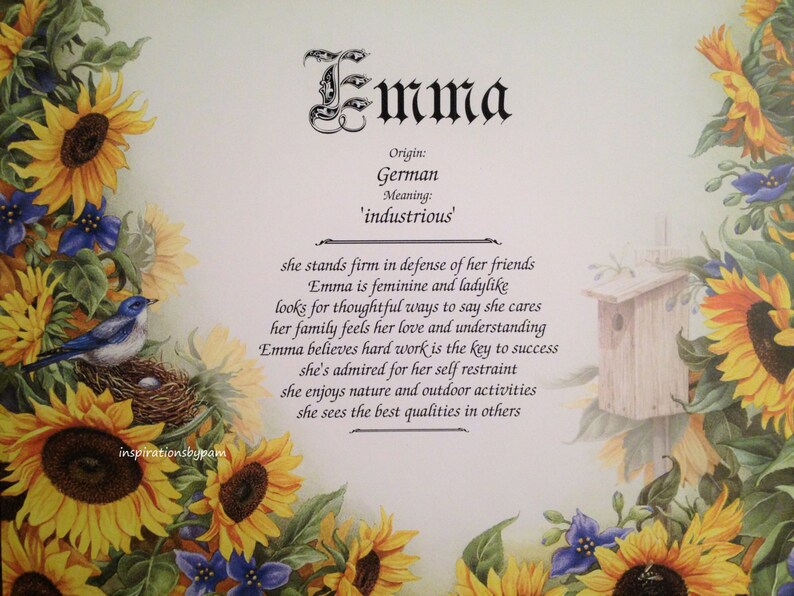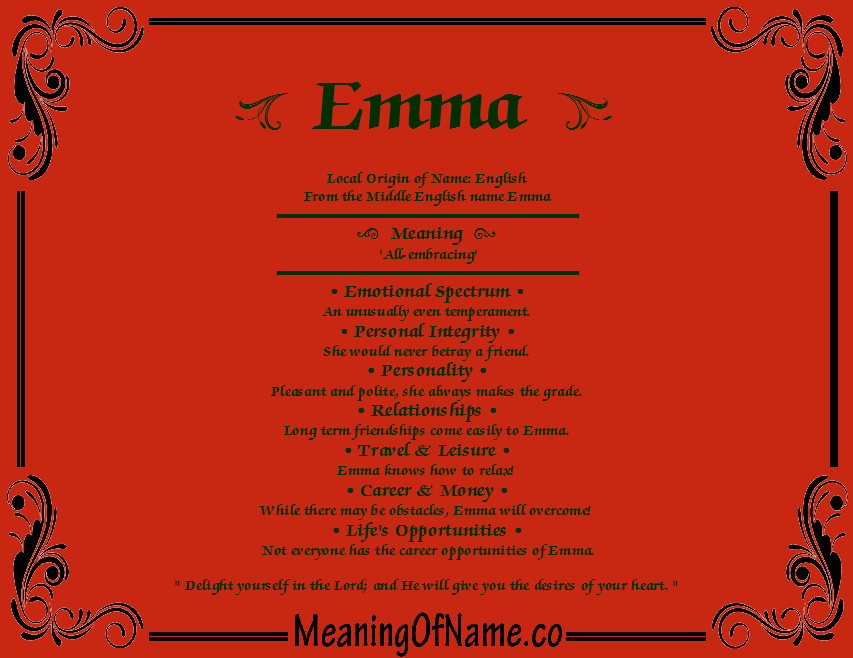
Emma Name Meaning Print Name Print Wall Art Minimalist Etsy
NAME "Emma" URSPRUNG, BEDEUTUNG, NAMENSTAG UND VIELES MEHR Bedeutung. Die Erhabene, von germanisch "ermana" = alles umfassend, gewaltig, erhaben . Namensursprung. germanisch. Herkunft/Sprache. dänisch deutsch englisch finnisch französisch holländisch italienisch norwegisch russisch schwedisch spanisch ungarisch.

Emma Name Meaning Printable Art. Purple and Blue Butterflies Etsy
Der Vorname Emma bedeutet »die Große« oder auch »die Allumfassende«. Diese Bedeutung lässt sich zurückführen auf althochdeutsche Worte wie »irmina« und »ermana«. Emma sucht das Glück. Ein persönliches, individuelles und glückliches Buch für Emma. Glücksbuch für Emma erstellen In diesem Buch erlebt Emma ihre ganz eigene,

EMMA Personalized Name Print / Typography Print / Detailed (names, character names, meaning
Emma (Vorname) Emma ist ein weiblicher Vorname . Inhaltsverzeichnis 1 Herkunft und Bedeutung 2 Verbreitung 2.1 International 2.2 Deutscher Sprachraum 3 Varianten 4 Namenstag 5 Namensträgerinnen 5.1 Fiktive Personen 6 Weblinks 7 Siehe auch 8 Einzelnachweise Herkunft und Bedeutung Bei Emma handelt es sich um eine eigenständige Kurzform von

Emma Vorname Bedeutung Kunstdruck8 x Etsy
The name Emma is a girl's name of German origin meaning "universal". Emma originated as a diminutive for Germanic names beginning with the ermen root. A very old royal name well used throughout the centuries—Queen Emma married King Ethelred the Unready in 1002—Emma is also historically associated with Lady Hamilton, the mistress of Lord.

Personalized Emma First Name Meaning Art PrintName
Der weibliche Vorname Emma bedeutet übersetzt „die Allumfassende" und „die Große". Emma geht auf den Namen „Irmin" zurück, und hat daher eine althochdeutsche Herkunft. Der Name war schon im 19. Jahrhundert sehr beliebt und gehört auch heute wieder zu den häufigsten Namen in Deutschland. Weiterlesen Woher kommt der Name Emma?

8x10 Emma Name Meaning Digital Print Etsy
[4] Notable people Emma, Lady Hamilton (1765-1815), English artist's model and performer Emma, Lady Radford (died 1937), English antiquarian and public servant Emma of Anjou (c. 1140 - c. 1214), Welsh royalty and half-sister of King Henry II of England Emma of Austrasia (fl. early seventy century), Frankish royalty

The hidden meaning of the name Emma Namious
Popularity: 5. Origin: German. Meaning: entire or universal. Emma is a girl's given name of German origin that originally denoted names beginning with "ermen." This elegant name means "whole" or "universe," which is fitting, seeing as baby will undoubtedly be the center of your world! Emma has royal roots and for centuries it was synonymous.

Emma Vorname Bedeutung Art Printspanische Emma Name Bedeutung
What is the meaning of the name Emma? The name Emma is primarily a female name of German origin that means Universal. The name Emma is of German origin and is derived from the Germanic word "ermen" which means "whole" or "universal." It was a popular name among the Germanic tribes and was brought to England by the Normans after the Norman.

Emma Meaning of Name
Emma is an English name with roots in an old Germanic word meaning "whole" or "universal." A perfect fit for the baby who will be your whole world! Its initial popularity in England can be attributed to Emma of Normandy, who married the English kings Aethelred II and later Cnut the Great.

Emma Name Meaning Printable Name Art Modern Nursery Decor Etsy
In Deutschland wird der Name insbesondere seit 2006 sehr oft vergeben und steht auch öfter auf dem ersten Platz der beliebtesten Mädchennamen. Der Name Emma stammt von dem althochdeutschen Namen "Erma" ab, der übersetzt soviel wie "groß" und "göttlich" bedeutet. Deswegen wird der beliebte Vorname oft auch als "Die Göttliche" übersetzt.

Bedeutung Name Emma Emma rhyming, similar names and popularity. Drawgloop
This name derives from the Germanic name element "*ermunaz," meaning "strong, whole, tall, exalted, whole, great, powerful.". Originally was a short form of Germanic names that began with the element "ermen," as Ermengarde, Ermentrude, and Ermenegilda. Emma also represents a diminutive vernacular form of Emily, Emmeline, Amelia, or.

Emma Meaning of Name
Der Name wurde abgeleitet vom Germanischen Wort „ermana" (groß, gewaltig, allumfassend) beziehungsweise vom Althochdeutschen „irmin" (gewaltig, groß). Somit ist Emma „die Große", die „Gewaltige". Wenn man so will, ist sie eine beeindruckende Person in vielerlei Hinsicht. Jemand, der auffällt, nach dem man sich umdreht oder der im Gedächtnis bleibt.

Name Emma Bedeutung, Herkunft, Beliebtheit & Namenstag
Herkunft und Bedeutung des Vornamens Emma. Emma stammt aus dem Althochdeutschen und bedeutet „allumfassend" oder „groß.". Anderen Interpretationen zufolge stammt Emma von Imme ab (bedeutet „die Biene" oder „die Fleißige") oder ist eine Kurzform von Namen, die mit Irm- beginnen. Besonders beliebt ist der Name Emma in.

Emma Name Meanings And Origins meaning behind name
When translated to Hebrew, it means "all containing." Gender: Emma is traditionally a female's name. Origin: The name Emma traces its origin to German's ermen meaning "whole" or "universal." Pronunciation: The most common pronunciation is "Em-mah." Popularity: Very popular in many countries.

The meaning of Emma. Names with meaning, Meant to be, Baby girl names
The name was introduced into England by Emma, d. of Richard I, Duke of Normandy, who m. (1) 1002 King Ethelred the Unready, and (2) 1017 King Cnut. It was a favourite Norman name, and was common from the 11th C onwards. The English form was Em and Emm, which is found as late as the middle of the 18th C, and the diminutive Emmet was also common.

name meaning emma Google Search Names with meaning, Biblical names, Names
Originally a short form of Germanic names that began with the element irmin meaning "whole" or "great" (Proto-Germanic * ermunaz ). It was introduced to England by Emma of Normandy, who was the wife both of King Ethelred II (and by him the mother of Edward the Confessor) and later of King Canute. It was also borne by an 11th-century Austrian.